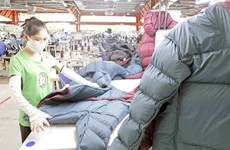VN voices dissatisfaction with anti-dumping tax extension
Vietnam is discontented with the
Council of European Union (CEU)’s decision on the extension of
anti-dumping duties on leather-capped shoes from Vietnam for 15 months
as of Jan. 3, 2010, said Vietnamese Foreign Ministry’s spokeswoman
Nguyen Phuong Nga.
Vietnam is discontented with the
Council of European Union (CEU)’s decision on the extension of
anti-dumping duties on leather-capped shoes from Vietnam for 15 months
as of Jan. 3, 2010, said Vietnamese Foreign Ministry’s spokeswoman
Nguyen Phuong Nga.
“This is an unobjective and unfair decision and does not reflect the practical conditions of Vietnamese footwear production and business in the country. It goes counter to the trade liberalisation spirit launched and promoted by the European Union,” Nga told the press on Dec. 23.
She went on to say that the decision has not only created negative impacts on workers in poor developing nations like Vietnam but EU importers, distributors, retailers and consumers as well. It also reduced the effectiveness of the EU’s efforts in hunger eradication and poverty reduction in Vietnam , she added.
Deputy Minister of Industry and Trade Le Danh Vinh expressed his great disappointment to the EU’s unjust decision.
He took the occasion to reaffirm that Vietnamese footwear companies did not dump their products into the European market and the EC’s application of punitive taxes aimed to defend the interests of a small group of European footwear makers unable to compete with Vietnam .
During more than three years of anti-dumping duties imposition, the export turnovers and market share of Vietnam’s upper leather footwear to the EU have decreased significantly while the export price has a tendency of increasing. Vietnam ’s footwear exports to the EU market fetched only 1.6 billion USD in the first nine months of 2009, a year-on-year decline of more than 11 percent.
The European Commission, however, did not consider this matter objectively and fairly towards Vietnam, he added.
The EC’s decision has caused a severe adverse impact on Vietnam’s footwear industry that is employing more than 650,000 workers, mainly female, the deputy minister said, adding that they have to face a “double” impact from the European Community’s decision to remove the application of the Generalised System of Preferences (GSP) regulation to Vietnam’s leather shoes.
Moreover, the decision has negatively impacted EU investors, importers, distributors and interests of millions consumers in the region, Vinh noted.
He also confirmed that the continuation of anti-dumping duties on Vietnamese upper leather shoes was not in line with the fine development of bilateral trade relations between Vietnam and the European Community when Vietnam is doing its best to build a favourable environment for investors, including European investors.
Representatives of Vietnam’s relevant agencies have also protested this decision.
Deputy Prime Minister and Foreign Minister Pham Gia Khiem sent letters to Foreign Ministers of EU countries, expressing his concern over the issue. Minister of Industry and Trade Vu Huy Hoang also sent letters to Ministers of Economics and Trade of EU member states and held meetings with ambassadors of EU countries on the issue./.
“This is an unobjective and unfair decision and does not reflect the practical conditions of Vietnamese footwear production and business in the country. It goes counter to the trade liberalisation spirit launched and promoted by the European Union,” Nga told the press on Dec. 23.
She went on to say that the decision has not only created negative impacts on workers in poor developing nations like Vietnam but EU importers, distributors, retailers and consumers as well. It also reduced the effectiveness of the EU’s efforts in hunger eradication and poverty reduction in Vietnam , she added.
Deputy Minister of Industry and Trade Le Danh Vinh expressed his great disappointment to the EU’s unjust decision.
He took the occasion to reaffirm that Vietnamese footwear companies did not dump their products into the European market and the EC’s application of punitive taxes aimed to defend the interests of a small group of European footwear makers unable to compete with Vietnam .
During more than three years of anti-dumping duties imposition, the export turnovers and market share of Vietnam’s upper leather footwear to the EU have decreased significantly while the export price has a tendency of increasing. Vietnam ’s footwear exports to the EU market fetched only 1.6 billion USD in the first nine months of 2009, a year-on-year decline of more than 11 percent.
The European Commission, however, did not consider this matter objectively and fairly towards Vietnam, he added.
The EC’s decision has caused a severe adverse impact on Vietnam’s footwear industry that is employing more than 650,000 workers, mainly female, the deputy minister said, adding that they have to face a “double” impact from the European Community’s decision to remove the application of the Generalised System of Preferences (GSP) regulation to Vietnam’s leather shoes.
Moreover, the decision has negatively impacted EU investors, importers, distributors and interests of millions consumers in the region, Vinh noted.
He also confirmed that the continuation of anti-dumping duties on Vietnamese upper leather shoes was not in line with the fine development of bilateral trade relations between Vietnam and the European Community when Vietnam is doing its best to build a favourable environment for investors, including European investors.
Representatives of Vietnam’s relevant agencies have also protested this decision.
Deputy Prime Minister and Foreign Minister Pham Gia Khiem sent letters to Foreign Ministers of EU countries, expressing his concern over the issue. Minister of Industry and Trade Vu Huy Hoang also sent letters to Ministers of Economics and Trade of EU member states and held meetings with ambassadors of EU countries on the issue./.












